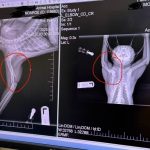I have been in the rescue world for many years and have gone through heartworm treatment with more dogs than I can count at this juncture sadly. I am not familiar with having them sit when outside? I just checked the American Heartworm Society’s website to see if maybe there was an update I wasn’t familiar with but couldn’t find anything. I have always kept my foster confined to a crate or small area (sounds like what you describe in your kitchen). Outside time is for potty purposes only and on a 6′ lead. Yes, enrichment is important and depending on the dog’s personality we do use meds as needed to keep them calm. It’s a long process for them and us and the day they can come off restrictions is cause for celebration! I would relay the shivering/shaking that you describe to your vet so they can determine how to best proceed or if this would be of concern to them. Good luck! And start planning the “pawty” for when life can resume as normal!
I’m a loving pet owner with a 12 yr old Morkie (who is dying from prostate cancer$ and a Yorkie puppy (who we got before the cancer diagnosis). Interested in how to know signs of imminent death or the need to euthanize. Also, tips on keeping the Yorkie’s “puppy-ism” from causing the Morkie to be overwhelmed with fear, discontent, concern, feeling outcast.
Comments
My dog Nick is going through heart worm treatment and I have a few questions…
he is 12 days post 1st injection as of today. He is on Prednisone once daily, and has Gabapentin 300mg which I give as needed.
he seems to shiver quite a bit – is he cold or feeling uncomfortable? I understand that the worms are dying and disintegrating. Is that painful for him? Does it cause pressure in his lungs? That is where this process takes place – is that correct?
I keep him a small room with me and in a crate when unsupervised. If I am in the kitchen he is leashed and laying on the floor. Only goes upstairs at night. I am giving him enrichment toys however he did eat (literally) half of one and had to go to vet to vomit the toy-my fault, I know he eats things. He is on a short leash for potty breaks. The heart worm society recommends having the dog sit at each stage for going outside, this little man will do anything for a treat and this works great for him. Does this seem like a good approach?
Thoughts or suggestions are appreciated.
Thank you!
Comments
About 2 months ago my 11-Year-Old English chocolate Lab started developing a cough. It started off mild at first with a couple coughing fits here and there. I got her to the vet as soon as I could get an appointment. She was ruled out for kennel cough because she’s up to date on shots, she never is boarded and she never goes to dog parks. They started a round of antibiotics, and cough suppressants. It didn’t seem to work so we went back. They did a lot of tests which of course was a lot of money. She’s diabetic so congestive heart failure was a concern but through testing and an X-ray they said they don’t believe it has to do with her heart & there didn’t seem to be fluid around her lungs either.. She was then put on steroids because they thought it might be inflammation. It didn’t seem to help any & her cough has only gotten progressively worse. We went back again and now they put her on a different round of antibiotics & another script that I have to fill at a human pharmacy for Codeine I believe. She has coughing fits almost every 20 to 30 minutes and sometimes with rubbing of her neck it helps calm them down. Her coughing spasms generally produce a lot of phlegmy spit up. I’ve spent more money than I have to try to get her help but we haven’t been able to get any answers. I was told it could possibly be Laryngeal Paralysis but the only way to truly confirm was to take her to a specialist and spend a lot more money to put my 11-year-old senior diabetic dog under sedation for an invasive procedure to diagnose. I’m not even sure what the fix for that would be if there is one and I’m sure it’s thousands more $$$ for a girl who may not make it through all that. It’s heartbreaking watching her struggle., I don’t really know what to think or do, just at a devastating loss watching my poor girl suffer. Within the last week, my once always hungry Labrador who never turned down any type of food down has stopped eating her normal food and treats that she used to love. She now only accepts wet food and soft meaty treats. I’m not really sure where to go. I don’t think the ER is the best answer here and again I’ve spent way more money than I even have to try to find an answer. Just trying to find any guidance/advice/assistance/suggestions and/or answers that I possibly can. Thank you in advance.
Comments
I’m have a 7month old female tortie who broke her left humerus last night. The ER vet at falls road animal hospital who was the only ER able to take her, and delayed a surgery to do so, said it was a spiral fracture and they were worried it could puncture through the skin. I was quoted $1400 for everything needed before surgery. They say they can do surgery Thursday which they estimated to be 4-5k but has always been higher in my experience with them so I am anticipating 6k. I do not have those funds. I made a gofundme, waggle, and posted to fb groups. I’ve reached out to other vets like JVC, timonium, padonia, spaynow for second opinions. Hoping to hear back. Especially from Dr Magnifico at JVC as she has come the mostly highly recommended on every post I’ve made.
Any help would be beneficial.
Comments
Dou, my female mixed-breed dog, was spayed a while ago. She weighs around 38 kg, which is too heavy for her, making it hard for her to walk because her joints struggle to support her weight. She’s been on joint supplements (as attached below) for a year, and that’s helped her move better. Recently, though, she’s been vomiting a lot, especially after eating or drinking, and the vomit is yellow. She’s also lost her appetite. I took her to a local vet and followed their treatment, but she’s not getting better. I’d like some online advice to help her feel better.
I have a poor feral cat out back who got an abscess. I did not know what was going on about 8 days ago when I noticed her face or side of its head swelling. The cat seemed to be disoriented. In retrospect, I think the cat was febrile and suffering.
The next day the abscess popped. It was a big open sore for 2-3 days. Now it is healing, and the cat seems more comfortable. The cat is moving, and eating food & water in a couple of different locations. It has also slept in two different shelter spaces. (I replace the bedding in those.)
The wound on the side of its face appears to be healing. Given that the cat is feral, I did not want to try to administer antibiotics topically or orally. I considered putting the cat in a cage, and taking it to the vet. However, given its bad physical health, I almost sure the vet would rightfully put the cat down. Also, the trauma and stress of trapping the animal would be counterproductive.
The sore is very large – but as I said healing. I am afraid of secondary infections or chronic, growing infections. Are there any signs I can look for to determine whether or not the cat has a good chance of recovery, or is going downhill?
Joe
Comments
Hello Dr. Magnifico,
My golden retriever has been having a problem with hematomas on both ears for the last few months. We have tried everything short of surgery. I saw a video of you on YouTube treating a labrador with a drain. Is this very successful? Do you know of any vet close to me who does this technique. If not, I am willing to come to you. We are really at our wit’s end.
Thank you,
Lenore DeLorenzo
Levi has hind legs due to IVDD. I’m so saddened to see him like this. He is only 4.5 years old and otherwise very active and happy. Dr. Magnífico your videos of Hank’s progress has given me hope. My question is why is he trembling despite being resting and under pain and anti-inflammatory medication? He can move his front legs, but he is not eating and just drinks water with a syringe. His symptoms began on Saturday, December 28. The Vet saw him Sunday morning and said we should keep him strictly rested for about 30 days. He is urinating and defecating on his diapers. My wife keeps him clean and changes his position every three hours. Day six no progress. Is there hope and is the trembling part of the recovery process? Also he can’t lift his head and is there a way to know if he is suffering from Myelomalacia? I appreciate you Dr. Magnífico for your passion in caring for our beloved furry family!
Comments
Hey so a couple of months ago,my dog had a sort of a film that was covering his eye and it has been growing and it seemed like a bother ( I could see his perception greatly reduced. I asked the former owner about it but he told me that it might be age. I overlooked it until it started to become to disturbing, he’s been getting a lot of eye discharge. No matter how much I remove,it simply comes back the following day. I live in a very rural area and there’s no vetinary close and to top it off I’m ina non-english speaking country and I don’t know any other language besides that.so I decided to ask for help, and that’s how I’m here, I also took note that this film is somewhat forming in his other eye,very easy to overlook but I can’t afford to, if anyone can offer some sort of help or advice I would really appreciate it.
Comments
Hi, I’m just about to bring my cat home who has multiple rib fractures. She was hit by a car. She is not eating on her own nor drinking. I’m not even sure how to pick her up. I’m pretty scared is there any advice that someone could give me.











Hey there.
I’m so sorry to hear about this. It’s not easy, watching our pets go slowly.
After Dr. Magnifico posted about this awhile back, I had a list of Things my cat liked to do. As the list shrank, I knew we were closer and closer to letting him go. My list included eating, drinking, cuddling, playing, etc. I would make a similar list for your dog, and monitor based on that.
For the puppy, I would honestly keep them separate when pup is acting like a puppy. This could be as simple as tethering him to someone when he can be supervised (something I recommend anyway for the first 6 months to help with housebreaking and general naughty behavior) and crating when he can’t.
Thank you, Laura!